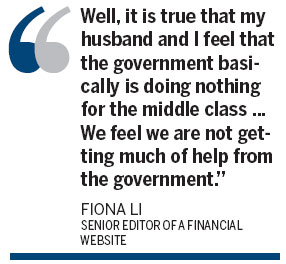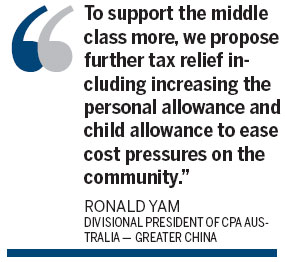Poor bread for the sandwich class
Updated: 2014-03-14 06:20
By Sophie He(HK Edition)
|
|||||||||
Everywhere one looks these days, the middle class is becoming restive. Hong Kong is no exception in a shifting economic climate that has left middle income earners feeling under siege. Sophie He reports.
Financial Secretary John Tsang Chun-wah came under renewed criticism for neglecting the plight of the middle class, in his 2014-15 budget. Criticism rained down despite the government's declared intention to spend some HK$20 billion ($2.6 billion) on one-off relief measures by year's end.
While there is no "official" designation for what comprises the city's middle class, it is a status popularly conferred upon those who have property, education, and upscale lifestyle that may involve a lot of "drinking coffee and watching French cinema".
Ronald Yam, divisional president of CPA Australia - Greater China, tells China Daily, "middle class" should comprise that groups of people whose personal income is between HK$30,000 and HK$150,000 per month.
People who earn HK$100,000 dollars a month, or even HK$30,000 a month really don't give much thought to whether or not the government subsidizes them for HK$150 on their electricity bill, or charge another HK$4 on a pack of cigarettes. They think the issues facing them are of much greater impact than what can be addressed with a handful of dollars.
Fiona Li is in her early 30s, the senior editor of a financial website. Her husband is a researcher at a think tank. Between their two incomes, the couple earn between HK$50,000 and HK$60,000 a month. They have two sons, one and three-years old.
The couple bought an 800-square foot, three-bedroom apartment in Tseung Kwan O last year. The mortgage costs them HK$16,000 a month.
Li said that her husband pays the mortgage and takes care of the groceries, which cost HK$5,000 to HK$6,000 a month. Li is responsible for the other expenses, including salary for a domestic helper, around HK$5,000 a month.
Thanks to the Pre-primary Education Voucher Scheme (a government subsidy on fees at non-profit kindergartens), Li pays only several hundred dollars a month for her older son to go to kindergarten. The fee for her younger son's enrollment in play groups is around HK$1,500 per month.
"I also pay for the electricity, gas and water bills which could cost more than HK$1,500 every month, and there is the HK$1,300 management fee and some credit card bills which are around HK$6,000 to HK$7,000 per month," she said.
The family spent around HK$40,000 a month, said Li, stressing this was the expenditure in a "normal month," no unexpected expenses, no fancy restaurant dinners and no family travel.
She also points out the she and her husband currently doesn't give money to their parents. Her parents are living on the mainland. Her in-laws are still working and don't need support.
"Well, it is true that my husband and I feel that the government basically is doing nothing for the middle class," she said. "We feel we are not getting much help from the government."
She said that she wishes the government would be more flexible about the Pre-primary Education Voucher Scheme, believing the subsidy should go directly to the parents of students rather than to kindergartens. That would give parents more choice.
"I have this friend who lives in South Horizons. There is no government subsidized kindergarten there, so my friend would have to pay expensive fees for her daughter to go to kindergarten."
Assist HK grassroots
When asked about if she would prefer higher tax deductions or for a continuation of the subsidized electricity bill, she replied, "to be honest I don't care that much. For families like mine, with monthly expenses of over HK$40,000, even if you increase the tax deduction by another, let's say, several thousand dollars every year, it will not make much of a difference in our lives," she answered.
As for the subsidy of electricity bill, it was HK$150 per month, but Li said her family's electricity bill once went up to HK$3,000.
"So we really don't feel that different with or without the HK$150."
Li said she didn't find much to help her family, either in this year's Policy Address or the Budget.
"If I were the Chief Executive or Financial Secretary, I probably would have done the same thing: focusing my limited resources on helping the poor," she said, adding that she believes there is a large number of "grass roots" people in Hong Kong. For them, a matter of a few hundred dollars a month may make a difference, so perhaps the government should tend to their needs.
Indeed, the majority of Hong Kong people earn less than HK$30,000 per month, far less.
According to the Census and Statistics Department, in 2011 the median monthly income for men was HK$13,000, up from HK$12,000 a decade ago. Women's incomes rose to HK$11,000 from HK$10,000 in 2001. While incomes rose less than 10 percent over the period, the inflation rate for the same period hit 30 percent. The lives of ordinary Hong Kong people are not getting better. Their purchasing power has been sharply eroded.
The people in Hong Kong who most resent the government's abandonment of some "one off" relief measures usually are those referred to as the "sandwich class". The term depicts Hong Kong's lower-middle class, stuck in the middle between the large population receiving public assistance and the smaller group able to afford private residences and luxurious lifestyles.
Cindy Leung, an administrative assistant at a local company falls into that category. Her husband is a civil servant. The couple has a daughter who will be two next month.
Leung told China Daily she and her husband earn around HK$35,000 a month.
The family resides in her mother-in-law's public rental housing unit, a 500 square foot, three-bedroom apartment in Kwun Tong.
"There are eight people living in that small apartment," she said. Her family live in one bedroom, Leung's mother-in-law and her sister-in-law live in another room while Leung's husband's elder brother and his family live in the third bedroom.
"It's a nightmare for me every day," she said, "of course I want to move out with my family, but we have to take a lot of things into consideration, and it is very likely that we could not afford the extra expenses."
Leung said that her daughter will go to pre-nursery school in September. Pre-nursery schools are not subsidized by the government's Pre-primary Education Voucher Scheme, so the family will have to pay the HK$3,900 fee every month. The school bus will cost an extra HK$1,000 per month.
"If we move out, the rent for a two-bedroom apartment will be at least HK$10,000 per month. We will need to hire a domestic helper, which would cost us around HK$5,000 every month," said Leung, adding that just these three expenses already amount to HK$20,000.
"And we need to shop for food and groceries, pay the electricity, gas and water bills, pay for our daily transportation and insurance which could be around HK$10,000."
She also believes her daughter is still too young to be entrusted to the care of a "stranger" while Leung and her husband are at work.

"There was this day, I really missed my daughter after working all day and I ran home, but when I stood in front of the door, I couldn't bring myself to open it. I didn't want to be in that apartment, it is just too crowded."
Leung said she feels the government has failed in provide families like hers with enough support.
She points out that the Financial Secretary announced an increase in the allowance for maintaining dependent parents, but did not increase the "child allowance". She says that makes no sense to her.
"I feel that the government is encouraging young couples to have more children, but they really should introduce some incentive policies instead of just saying that," said Leung.
She also wants the government to expand the Pre-primary Education Voucher Scheme to include pre-nursery schools while increasing the fee subsidy.
Sandwich class overlooked
Leung resents the cancellation of the electricity subsidy and believes that policy only makes the situation worse.
"Sometimes I consider having another child. I want my daughter to have siblings, but most of the time I feel it may just be a dream. The price of everything is going up quickly while our salaries stay at the same level," she said.
Ronald Yam, notes that most of the relief measures in the latest Budget focus on social welfare and are designed to help low-income families, such as the extra allowance to Comprehensive Social Security Assistance recipients and the extra allowance to Old Age Allowance recipients.
"However, we feel that the middle class or the so-called sandwich class has been largely overlooked," said Yam. He says he is happy to see that some of the benefits are being continued, like the government reduction of the salaries tax by 75 percent, subject to a HK$10,000 a year ceiling. He adds however, it is disappointing that there was no increase in either the personal allowance or the child allowance, which could be very important to the middle class.
"We welcome the tax rebate but the proposed dependent parent allowance fell short of our expectations."

Yam said that the middle class is under a lot of pressure, most people have to pay mortgages for the apartments they own. Those who don't own properties, usually have to pay expensive rents.
All the while, they are supporting their parents while raising their kids, he said, adding that inflation is not helping, with the price of everything going up in Hong Kong every year, from the meals people have in the restaurants to transportation costs.
"To support the middle class more, we propose further tax relief including increasing the personal allowance and child allowance to ease cost pressures on the community."
These allowances should be linked to the Consumer Price Index, said Yam. To encourage a higher fertility rate, he also suggests increasing the child allowance from HK$70,000 to HK$200,000 per child in the year they are born. CPA Australia suggests that government allow taxpayers to claim deductions for medical insurance premiums under salaries tax and personal assessment, with the maximum of HK$20,000 per year, an extension of home loans to 25 years, from 20 years.
Yam also said Hong Kong's middle class is suffering from psychological stress arising from fiscal pressures. He said that the government is expecting a decline in revenue in the coming years, which could lead to a decline in people's earning power.
"I believe there is a pressing need for Hong Kong to initiate a comprehensive review of its tax system," he said. "CPA Australia suggests updating the long range forecast on a regular basis (every three to five years) and extending the forecast duration to follow the international standard of 40 to 50 years."
He stresses that the government should make long term plans and long term forecasts, so that people in Hong Kong, especially the middle class could make long-term plans for themselves and see that their future is ensured, "which could help to ease some of the pressures," said Yam.
Contact the writer at sophiehe@chinadailyhk.com

(HK Edition 03/14/2014 page5)